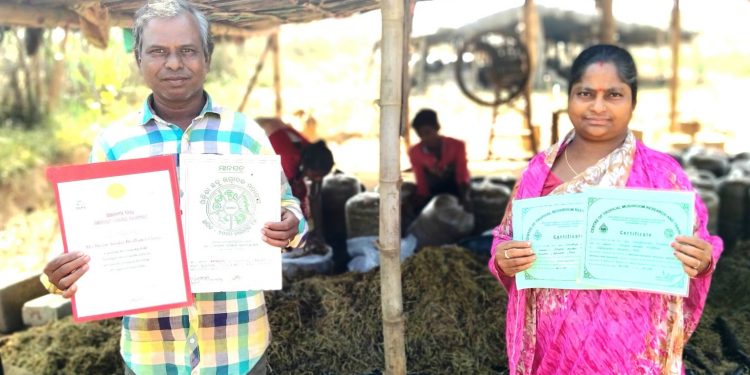Baipariguda: Maa Mangala Seeds and Production Centre at Majhiguda village of Doraguda panchayat under Baipariguda block in Koraput district is a household name in the district. This centre is famous for its proprietor couple — 51 years old Shyama Sundar Pradhan and 45 years old Sandhyarani Pradhan — who has been growing mushrooms for last 17 years.
The couple not only managed to transform their fortunes through mushroom farming, but also has encouraged many others to take up this profitable trade.
Shyama says their centre is known for two varieties of mushrooms (Oyster and Dingri). ‘We work at our farm all through the day. My job is only to take care of mushrooms. But my wife’s job is little bit difficult. Apart from collecting seeds, she plucks mushrooms, prepares varieties of pickles and dumplings,” says Shyama.
They grow the oyster (locally known as pala) variety during summer season and ‘Dingiri’ variety in winter.
Describing the process of growing ‘Dingiri’, Shyama says straws cut into pieces are first laid in a polythene packet. Then the seeds are put in them. Small holes are made on the polythene packets and then tied tightly. It is left untouched for 20 days following which, it is brought out and then water is sprinkled for at least eight days to see mushrooms popping out.
In case of ‘pala’ variety, a bed of straws is prepared in a shades place. Seeds are put into the straw beds before covering them with polythene sheets. On the ninth day, water is sprinkled and within 13 to 15 days mushrooms start coming out, he adds.
About the earning, he says a farmer needs three decimal of land where he can grow mushrooms all the year-round. An investment of Rs 10,000 will earn him a profit of Rs 10,000. If he prepares seeds, the income will increase significantly.
When asked how seeds are prepared, Shyandhyarani explains, “To get seeds, an autoclave machine, glass bottle and some boiled wheat grains are required. Yeasts are collected from chemically treated mushrooms. Bottles with baked wheat grains are sterilized in the autoclave machine. In a closed room lit with a spirit lamp, the yeasts are put into the bottle and then closed it hermetically. This bottle is kept in shade for several days to allow the yeasts to grow exponentially. And these yeasts are then used as seeds, she adds.
Mushroom farmers from within and outside the district come to their centre to buy seeds. Preparing seeds can earn one a profit of one-third of the entire preparation cost, they say.
Shyama is a native of Torabai village under Delang block in Puri district. Born in a farmer family, he devoted his time to cultivation after studying up to Plus II.
With ten farmers, Odisha University of Agriculture and Technology (OUAT) first started a mushroom cultivation camp at Dandamukunapur village under Puri block in an experimental basis back in 1984. After getting the training, Shyama started growing mushrooms and soon earned a name as a successful mushroom framer in Bhubaneswar. In 2002, a Baipariguda based NGO roped him in to set up a demo farm at Baipariguda.
Thereafter, under the active guidance of an OUAT professor Aditya Patra, the couple set up Maa Mangala Seeds and Production Centre. Sandhyarani also got mushroom pickle and dumpling making training.
“Many farmers from Baligaon, Petaladi, Limamadi and Dandabadi villages under Baipariguda block, Katalapadar and Digapur villages under Kundura block and many from Govindapalli area in Malkangiri district received training from us and have now become established mushroom farmers,” the couple said.
For their efforts to popularise mushroom farming, the couple has been awarded and felicitated by various government and non-government organizations.
PNN






































